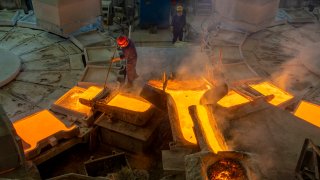
- Copper is seen as a leading indicator of economic health because of its use in many sectors.
- At the moment, prices are falling even though there's little indication of demand falling sharply or supply increasing, said Daniel Hynes of ANZ.
- But James Kan, head of Asia basic materials research at UBS, said Covid curbs in China could dampen demand for industrial commodities despite Beijing's plans to stimulate its economy through infrastructure.
Falling copper prices suggest that investors are negative on the outlook for the economy, a commodity strategist at ANZ bank said.
Copper is seen as a leading indicator of economic health because of its use in many sectors.
At the moment, prices are falling even though there's little indication of demand falling sharply or supply increasing, said Daniel Hynes of ANZ.
We're making it easier for you to find stories that matter with our new newsletter — The 4Front. Sign up here and get news that is important for you to your inbox.
"In fact, it's the exact opposite — we're actually seeing signs in China of that demand picture improving," he said.
But investors have taken the view that tightening monetary policy will lead to lower growth, and that's being reflected in the copper prices, he told CNBC's "Street Signs Asia" on Tuesday.
"It's telling me that investors are particularly bearish about the economic outlook," he said.
Money Report
The price of the red metal logged its biggest quarterly drop since 2011 in the second quarter of this year, according to Reuters.
Three-month copper on the London Metal Exchange was at $7,341 per ton on Thursday morning in Asia, having fallen sharply since early June.
Copper actually looks "relatively promising," Hynes said.
He acknowledged that the copper market's performance depends on how global sentiment changes as the U.S. Federal Reserve hikes interest rates, but said supply issues are likely to keep the market tight and fiscal stimulus measures in China over the next six to 12 months will boost demand.
Chinese President Xi Jinping called for an "all-out" effort to construct infrastructure in April, and Reuters reported that the country will set up a state infrastructure investment fund.
But James Kan, head of Asia basic materials research at UBS, said Covid curbs in China could dampen demand for industrial commodities despite Beijing's plans to stimulate its economy through infrastructure.
"Potentially, the mobility restrictions will sort of weaken the paths of demand coming back," he told CNBC's "Squawk Box Asia" on Tuesday.
A speedy recovery in demand is not the Swiss investment bank's base case, Kan said.
He said inventory growth is outpacing the pickup in industrial production, and inventory buildup is going to become an issue.
Even if demand for base metals jumps in China, inventories will be able to absorb that growth. Meanwhile, the rest of the global economy is likely to slow down, keeping demand in check.
"I think the overall demand-supply balance [is] probably still not going to be favorable for prices to have a good recovery," Kan said.
— CNBC's Evelyn Cheng contributed to this report.






